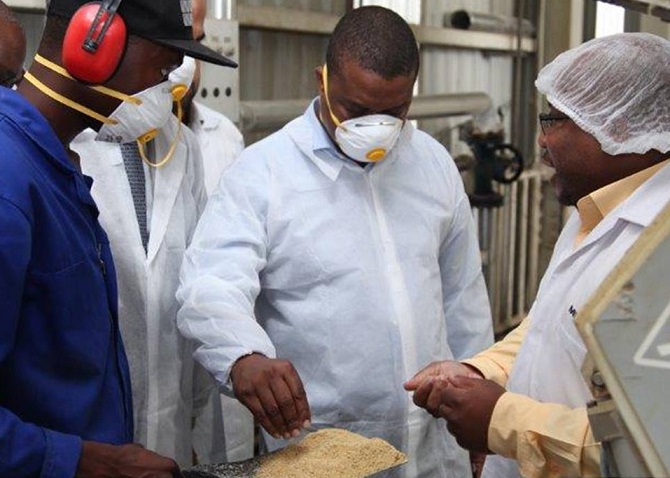Mozambique: Credit to economy falls 2% in June
Merec to utilise 30,000 tonnes of domestic corn – Mozambique

Photo courtesy of Merec Industries / Minister of Industry and Trade Max Tonela during his visit to Merec's Matola unit, July 10 2017
The MEREC agro processing plant will by the end of the year have taken up approximately 30,000 tons of maize produced in the provinces of Tete and Niassa, guaranteeing the commercialisation of agricultural surpluses and stimulating the Government’s aims of increased production and productivity.
The government, through the Mozambican Grains Institute (ICM), signed a memorandum of understanding with MEREC this Monday, July 10, in Matola, in the south of the country, to allow the surplus of national production to be collected and absorbed by this agro-processing industry.
The memorandum was signed by the Director General of ICM, João Macaringue, and his MEREC counterpart Gilberto Cossa.
Industry and Commerce Minister Max Tonela, who visited the agro-processing unit in Matola on Monday, said that projections indicated that there were surpluses in the order of 3.9 million tons of cereals.
At the moment, the main challenge, according to the minister, was the achievement of marketing goals, which had reached 17 percent in the first half of the year.
“We have had a positive response from the sector which will stimulate the increase in domestic demand and ensure an improvement in the level of negotiated prices with suppliers. We plan to create conditions for a continuous increase in production, especially cereals,” he said.

Tonela explained that the government also recently signed a memorandum of understanding with Higest, a plant dedicated to the production and marketing of feed and chicks, to purchase 1,400 tonnes of soybeans to be supplied to the company by the end of the current year.
MEREC Chairman Mahmud Charania said that the plant currently processes about 100 tonnes of maize and 140 tonnes of wheat per day, numbers which could rise given increased production and growing demand for cereals.
“We have our maize parameter, our needs, looking at the quality of each variety. We have already started to buy domestic maize in Manica and Sofala. And so we have good brands of corn flour and wheat flour with national demand,” he said.
The government has intervened in the marketing of surpluses to agro-processing industries that currently represent 22 per cent of the industry food sector in Mozambique, with a view to stimulating demand for home-grown cereal, thus replacing imports, on which the industry is still very dependent.













Leave a Reply
Be the First to Comment!
You must be logged in to post a comment.
You must be logged in to post a comment.